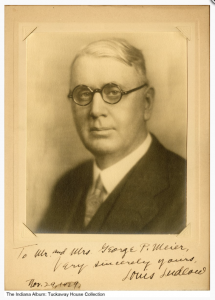
Photo info ...
Credit: The Indiana Album: Tuckaway House CollectionView Source
(June 24, 1873-Nov. 28, 1950). Louis Leon Ludlow was born in a log cabin in Fayette County. He graduated from high school in Connersville, Indiana, in 1892, and moved to Indianapolis where he became a newspaper reporter for the . After a brief stint in New York, Ludlow returned to Indianapolis and wrote for the and the .
In the fall of 1899, Ludlow became head of the political department for the . When that newspaper ceased publication in 1901, he returned to the and became its correspondent in the nation’s capital. Over the next 28 years, he served as the Washington correspondent for a number of newspapers in Indiana and Ohio. He also authored such books as the autobiographical (1924), the historical (1925), and the satirical (1927). He became president of the National Press Club in Washington, D.C., in March 1927, leading the organization when it moved to the new National Press Club Building.
When he left the presidency of the Press Club in January 1928, Ludlow returned to Indianapolis and pursued his political career. He became the first correspondent to journey from the press gallery to a seat in Congress when he defeated Republican incumbent Ralph E. Updike by approximately 6,000 votes in the race to represent Indiana’s 7th District (which included Marion County).
During his years in Congress, he became known for championing the rights of women, introducing an equal rights amendment in 1933, 1936, 1939, 1943, and 1945. He also supported civil rights for African Americans throughout his political career.
In 1938, he introduced bills that would have required the FBI to investigate lynchings with the hope of deterring hate crimes. Southern Democrats blocked the bills. Because of his stand in support of civil rights, he was particularly popular among women, African Americans, and Jewish voters. For his home constituency, he brought a veterans administration hospital to Indianapolis and was responsible for the establishment of an airmail route to the city.
Several times between 1935 and 1940, he forwarded an amendment to the U.S. Constitution that would have required a national referendum to declare war, except in case of attack. Although support for what became known as the “Ludlow Amendment” was strong in the 1930s, it disintegrated as political circumstances eroded in Europe on the eve of World War II, and ultimately it failed.
Ludlow reputedly set a record among U.S. Representatives for never returning to his home district in Indiana during congressional recesses. He did not even return home to campaign.
He voluntarily left Congress in 1949 and returned to work as a Washington news correspondent. Although he described himself as “Hoosier born and bred,” he never lived in Indiana again and is buried in Rock Creek Cemetery in Washington, D.C. In 1980, he was inducted into the Indiana Journalism Hall of Fame.

Help improve this entry
Contribute information, offer corrections, suggest images.
You can also recommend new entries related to this topic.